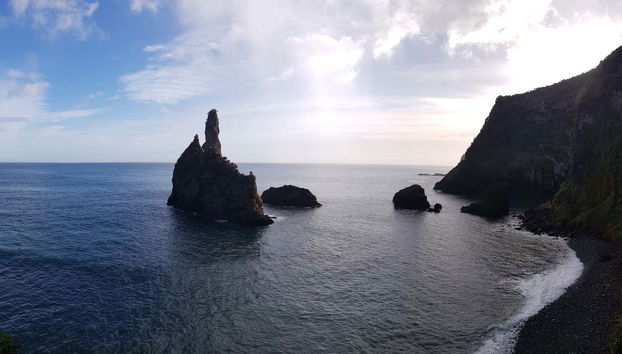
Flores Island Hiking Tours
- 4 Stunden
- 3 Bewertungen
- Geöffnet am Fr, Sa
Explore some of the most extraordinary corners of the Azores on a hiking tour of the island of Flores. Viewpoints, cliffs, hidden waterfalls and many surprises await!
Routes
At the time of booking, you'll have the choice between five different hiking routes. All of them have a duration of four hours, start at 9:00 am and include hotel pickup & return transfer, minibus transportation as well as an English-speaking guide.
Four Lakes
This route involves an 8-kilometer walk beginning between the Caldeira Negra and Comprida lagoons, featuring volcanic lakes and native vegetation. You will also see the Seca and Branca lagoons. This route concludes in Fajã Grande and Poço de Bacalhau, where swimming is possible.
Lajedo & Poço Ribeira do Ferreiro
Starting in the village of Lajedo, near the parish church, the 7.8-kilometer path leads through green meadows. Here, the guide will share relevant facts about the island, including the shipwreck of RMS Slavonia, followed by a visit to Poço Ribeira do Ferreiro, noted for its waterfalls.
Ponta Ruiva & Ponta Delgada
This hike starts at Ponta Ruiva, with an 8.5-kilometer walk along the coastline to appreciate steep cliffs and the island of Corvo. The route includes the Chapel of São João Baptista before reaching Ponta Delgada.
Ponta Delgada & Fajã Grande
The journey begins in Ponta Delgada, traversing green valleys toward prime viewpoints. This 7.5-kilometer hike features sights like the Albarnaz Lighthouse and the islet of Monchique, ending in Fajã Grande.
Ponta Ruiva & Santa Cruz de las Flores
This option departs from Ponta Ruiva towards Alagoa, highlighting unique rock formations across an 8-kilometer route, concluding in Santa Cruz de las Flores.
Preise
Inklusive
- Hotel pickup and return
- Transport by minibus
- English speaking guide
Tipps
- Accessibility: Not wheelchair accessible.




